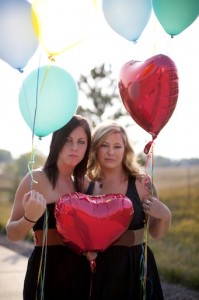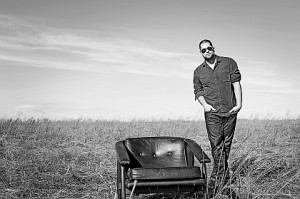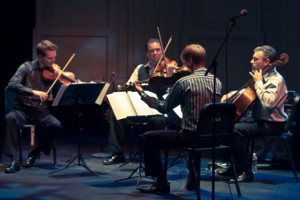I’m With Her, the indie-folk collaboration between established artists Angie Stevens and Haley E. Rydell, has been building momentum in the Denver scene the release of their self-titled EP nearly a year and a half ago. This week, after a successful Kickstarter campaign, they are set to release their next project, Songs We Said Goodbye To, with a much-anticipated release show this Friday, Nov. 2, at The Soiled Dove Underground in Denver.
Previewing the new record, I hear a fresh passion in these songs very similar to how the duo sounds when performing live. You can stream the first single from the record, “The Good, The Bad, My Mistakes,” at the end of the interview below.
Meanwhile, I was excited to sit down and talk with Angie and Haley about their new project, and they ended up sharing some pretty meaningful insights as to how their act has come about, and where their music is headed.
….
Jeff McQ: So first of all, obviously, tell us about the new record. What was the inspiration for the songs and the album title?
Haley E. Rydell: Well, it all kind of goes hand in hand, Songs We Said Goodbye To. So we had both gotten out of very serious relationships at the very same time, and writing music together was kind of the outlet for us, kind of the way to get through all the stuff we were going through. It worked out really pretty well. So that was kind of the main inspiration, just kind of starting a new chapter – ending one chapter, starting a new chapter. So all the songs kind of have their place in our own timelines of healing, I guess.
Jeff: Okay, so you’re not saying goodbye to the songs. You’re saying goodbye with these songs.
Haley: Yes.
Jeff: Or using them to help you say goodbye to certain parts of your life?
Haley: To certain parts of our life, yep, exactly.
Angie Stevens: Yeah. In some ways we did say goodbye to the songs, in that we said goodbye to that period of time for us. We had initially wanted to name [the record] “Hang Among the Stars” and then after going through the processing, it just didn’t represent the album. It didn’t represent what we put into it. It wasn’t about the “happy place” that we found with each other in our music. It was about the treacherous journey of…
Haley: That we took to get there.
Jeff: You both are songwriters. So did you find that you were collaborating more on this project? Or did each of you bring your own songs to the track list?
Angie: We definitely collaborated more on this than we did on the first one.
Haley: Yeah.
Angie: I would have ideas for songs and give her – make her, I should say, in some ways – input meaning, like, not what would necessarily go towards my song, but what would make it her song. She did that…
Haley: What would make it our song.
Angie: Yeah, our song, but more or less I wanted her input on it. Not just what would finish the song, but what it would be from her. So it was pretty profound.
Haley: But yeah, so we did a lot more collaborating. I think it’s more fun that way. We both get to put what we do into it. Both of our stories are in it.
Jeff: So, feel free to correct me if I’ve got a misperception about this, but you both had separate acts coming into this. It seems like this began sort of as a side project, but it’s now become the main project for both of you. Is that right?
Haley: That is correct.
Jeff: So what has prompted that shift? What made you decide to make this your primary thing?
Haley: Well I moved, so that kind of changed it pretty quickly. Unfortunately I had to leave all my bands back home behind, but it was just what I felt like I needed to do. This is where my heart was at. This is where I was still able to, I think, express myself to the full extent. So that’s what prompted that.
Angie: I mean, you’ll see at the CD release party, we have Susan and Carlos and Ryan. So there are incorporated members of Angie Stevens the Beautiful Wreck. But this is me turning from the bar bands and having to play in loud bars and doing it for a career, and really turning to the songs that people kept telling me not to play in those situations, because they were too quiet or they were too sad.
Haley: They couldn’t dance to them.
Angie: They couldn’t dance to them. I needed a place to be sad and to be honest. You know, the best song I’ve ever written was “Don’t Wait for Me”, which is all my song. But at the same time I don’t know if I could have shared that experience with the crowd that I had for Angie Stevens. That’s what we would change. I said to the band, “I don’t want to play the drinking songs. I want to play ‘Skyline Drive’. How did we become the drinking songs?” That was really hard for me. That’s not me. That’s a great money gig, and I count my blessings that I get paid as well as I do with Angie Stevens. But I’m With Her was like a no-pressure band. It was, “Let’s take one project that no one has a say in, and if they don’t like it, who cares?” If the critics don’t like it, if management doesn’t like it, if lawyers don’t like it, if my friends don’t like it, I don’t care anymore. Honestly, that’s where you house the best music is when you stop caring and just freaking play what you feel.
Jeff: You both seem to genuinely enjoy performing on stage even when the songs themselves are a bit more serious. Can you talk a little bit about what’s going on inside when you’re playing these songs? What are you feeling?
Haley: I think because these songs are so honest, every single time we play them I’m thinking about where they came from, what they mean. That feeling never goes away. That song is never going to mean any less because the feelings are always going to be there. I don’t know. I think just playing with each other, I think we bring out something in each other musically that just never gets old. Every time we play together, it’s just exciting.
Angie: It’s challenging. I mean, Haley has her strengths and I have mine and together it’s – every time we play it’s a new challenge. She challenges me musically and I challenge her performance-wise, every time. Again, she’s so much more casual now and so much more into it, and I’m also more into taking risks that I never took before because I didn’t believe in myself. So we have to go to that spot, and I tell her that. We’ve got to go there every single time. We have to visit that, because we have to be honest.
Jeff: So what can we look forward to with the CD release show? Any surprises, anything you want to tell us?
Haley: Oh, there are going to be surprises all over the place.
Jeff: Can you give us a couple of hints?
Haley: Yeah. We’re going to do some stuff by ourselves because that’s what I’m With Her is, it’s me and Angie. We’re [also] having, like Angie said, members of Angie Stevens and the Beautiful Wreck that will be playing with us. My brother is flying up from Fargo to play fiddle with us. It’s going to be awesome. We’ve got members of the Metro State Choir coming. We’ve got…
Angie: Something Underground…
Haley: …Something Underground boys…
Angie: All of them. We also have my sister’s benefit. My sister was diagnosed with breast cancer, so we’re doing a fundraiser at the event, auctioning off a bunch of different things, and that’s been a whole work in progress just in itself. But I’m going to guess, there’s probably going to be over 30 musicians.
Jeff: How are you planning to promote the CD itself? Are you going to try to do some stuff out of town? Or what are you going to do with it?
Angie: With Angie Stevens, I essentially choked the whole idea of becoming national and tried every method that was told I should try, and it didn’t work. I am not going to go after that. The most important thing in this album was to make music. Now the most important thing is to play good shows. We’re going to do a little bit of sending out the CD to people who already supported me before… But we are not going to knock down doors. It’s just not what we’re doing. It’s not what we’re about. It’s not where I’m at.
Haley: If people get it and like it, great, but that’s not what it’s about.
Angie: That being said, knowing it’s the best product that we’ve ever put out, and people are very excited about it, I don’t know where it’s going to end up. I’m not saying I’m completely opposed to it, but…you have to learn your lessons from your past, and I did. Haley was very new to that, because her personal band had never tried it, and her other band kind of already was in that scene. So it’s just not on my agenda. I think you have to focus on the music. I’ve been told that by critics all the time, and I didn’t listen. Now I’m like, “I’m just going to focus on the music, and if it works, great.”
….
I’m With Her unveils Songs We Said Goodbye To this Friday night at The Soiled Dove Underground, 7401 E. 1st St. in Denver. Opening act is Jalen Crossland. Tickets are $10 each, and are still available at the time of this writing (although word is they are going quickly). Doors are at 7:00 PM. Meanwhile, enjoy the preview track below!



